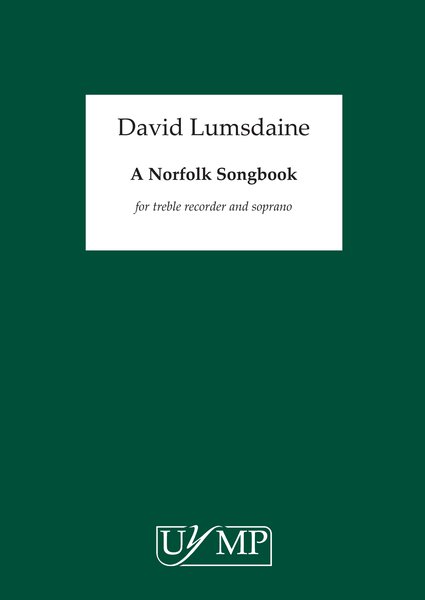Ten songs for soprano and recorder, texts by the composer
1. Gallows Hill Soprano and treble recorder
2. Hare Soprano and sopranino recorder
3. The world oozing Soprano and sopranino recorder
4. Hedgerow Soprano and descant recorder
5. Wind shouts Soprano and descant recorder
6. Barn Owl Soprano and tenor recorder
7. Gulls jostling Soprano and sopranino recorder
8. Rainbow dance Soprano and treble recorder
9. Black Sky Soprano and treble recorder
10. Spring tide Soprano and treble / bass recorder
For Tracey Chadwell and John Turner
Since 1972, the North Norfolk coast has been my English retreat for composing and meditating. There I wrote some poems in the spring of 1986, the same year the US used its air bases in North Norfolk for the bombing of Tripoli. They're not great poems, but they caught something essential for me, and provided the texts for Tracey's and John's song book.
1.
Gallows Hill is not
what I would call a hill, it rises
so gently from the shore. Yet here
I see fields, woods, town,
marshes, sea, spread straight to the horizon,
but mostly I see sky and clouds;
throughout the northern hemisphere
there's nothing to obscure the view.
There's always wind.
On the calmest day a breeze
still laps the corn,
tasting of salt and camomile.
Did they ever hang
a man or woman here?
Did someone—like myself—put
rope around a neck like mine,
pull gently, considerately,
till first the noose bit,
burnt my flesh, until
blood rising hot and hard and sure
I slowly burst for breath?
Now the name
is just some words upon a map,
a shadow to thrill the children
on a summer evening walk.
To the south, a monster plane
grinds
behind the wood of beech and pine and holly,
slowly emerges
above the deserted cottage,
and hoists its bulk into the heavy air.
On the wire fence
near where three roads meet
hang bright shrivelled
eyeless skins
of crow and rook
and weasel.
2.
Pheasant crows from the hedgerow,
partridges creak around the field,
the last thrush flourish from a spindly oak,
hare melts into dusk.
3.
Far, far off, a steeple
rises above the line of the marsh.
My boot marks dwindle,
stretching way back
to the edge of the mud.
Dunlins flicker along
the last creek left
by the falling tide.
A mile away, beyond the piping redshank,
an oilskin digs for shellfish
in no man's land.
After the piping,
only the sound
of the world oozing.
Where's the sea?
To the north,
already covering
dunlin, oilskin, mud-blisters, me.
4.
Hedgerow,
Yellowhammer,
Yellowhammer,
Yellowhammer,
passing tractor,
dust.
5.
The wind shouts,
hurls clouds of stinging sand.
A twist of curling foam
rips a buoy through the racing tide.
Whichever way I turn
something catches in my eye.
6.
White-flecked-tawny,
along the hedge
two hunched wings
carry a pair of eyes,
intent, alert.
Along the hedge and up the chase,
no shape or colour now,
bare movement in the least of light,
death passes silent,
rhythmical.
Returning along the field's further edge,
a sudden side-slip,
then steady flight across
the road—
death glides patiently in the growing light;
it floats on its own time
to feed young owls
by sunrise.
Yesterday, less patient birds
flew these skies to Libya.
What children did their
talons feed?
What dawn to their stark day?
7.
Gulls jostle the tide,
a band of oystercatchers ambushes a mud bank,
the sea wall shoots a lark into the sky;
whatever next?
8.
Black sky, grey beach,
the pines a shadow across the bay;
the rain sweeps in
on its side.
Everything is running!
9.
Sea retreated,
clouds blown away,
leaves still,
caught in the web of rain-washed sunlight
a spider
watches the Crossbills' rainbow dance.
10.
Spring tide of sunlight
rising over
sand,
mud,
water,
washing
the far line of pines, and
coast guard's hut,
gilding
creeks,
those diamond snakes,
twisting through the salt marsh,
flooding
grain ships
lolling at the quayside
grinning through their rusted paint,
battered metal proudly
gleaming,
floating
gulls twisting in currents of underlight,
hawking the wake of returning fishing boats, screaming,
bickering over drowned fish,
embracing
playground swings, war memorial, HARBOUR CAFE and public
lavatories smiling, gossiping, stretching arms,
nodding greetings to a
surprised, stranded
milk float
parked beneath the elevator of
the stolid granary, warming its bricks, which, standing high
above the quay, sees
the bank of grey cloud stretched out above the rising sun,
waiting to engulf it, and restore the little town to order, to mute
colours, soften edges, still reflections, before
the postman on his doorstep
sees it, drops his bag
and stands
amazed,
marooned.
DL, Crossing Cottage, Warham, North Norfolk, Spring 1986.



